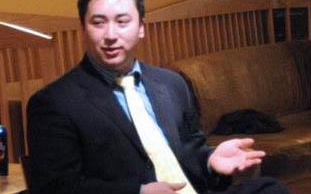Mindfulness is biting into an apple without trying to read a book at the same time. It is taking deep breaths when sitting in traffic or waiting in an elevator. It is paying attention to what is happening now and not stressing about the future or worrying about the past.
At least, according to “Savor: Mindful Eating, Mindful Life,” a new book published last week co-authored by Harvard nutritionist Lilian W. Cheung that combines Buddhist philosophy with healthy eating habits.
Cheung—a nutrition lecturer at the Harvard School of Public Health who studied under Buddhist Zen master and co-author Thich Nhat Hanh in 1997—suggests that a healthy lifestyle stems from healthy eating and a focus on reducing stress.
“Mindfulness is the underpinning of Buddhist teaching,” Cheung said. “And in Buddhism, the premise of life is suffering, but there is a way out of any suffering.”
Cheung details the mindful meditation method in the book’s second chapter, which takes the reader through an apple meditation exercise that involves carefully washing an apple, feeling it, focusing on its freshness, and breathing before taking the first bite.
The exercise results in a more conscious enjoyment of the apple, Cheung said, adding that its application to other activities leads to a more positive lifestyle.
“Our minds are racing constantly,” Cheung said. “We are not really fully into the food, being able to savor the food itself, [and] the art form of it.”
She later extends the apple meditation example to daily exercises in meditation—such as the brushing-teeth meditation, the traffic-jam meditation, or the light-switch meditation—emphasizing that meditation can be done at any time of day.
The book, which begins with a Buddhist’s perspective on weight control, is written in a language that is accessible to those who may not be familiar with the religion.
“Buddhism is not really a religion in the U.S.,” Cheung said. “Buddhism is a philosophy. Buddha basically means 'awake.' Anyone can start by being a part-time Buddha.”
The challenge to achieving mindfulness, Cheung said, is realizing that it is a habit that needs practice first.
“I hope [everyone] will find a little bit of time to practice,” Cheung said, “because it will help everyone juggle the many things in their lives, and they will feel much less stressed.”
—Staff writer Xi Yu can be reached at xyu@college.harvard.edu.
Read more in News
Harvard College Hikes Costs Past $50,000Recommended Articles
-
 Cheung Discusses Plans For Council
Cheung Discusses Plans For Council -
 Politics Isn't Rocket Science—Or Is It?
Politics Isn't Rocket Science—Or Is It? -
City Council Slams Business as UsualThe Cambridge City Council expressed uneasiness about collaborating with the City of Boston on future development efforts last night after Vertex, a Cambridge-based pharmaceutical company, announced that it will move its headquarters to Boston’s Fan Pier waterfront in 2013.
-
 Not your Average Candidate
Not your Average Candidate -
 Piece of Mind? Piece of Cake
Piece of Mind? Piece of Cake -
As Healy Departs, Cambridge City Council Looks to Find ReplacementWith longtime City Manager Robert W. Healy’s contract due to expire in June 2013, the Cambridge City Council has begun the search for his replacement.













